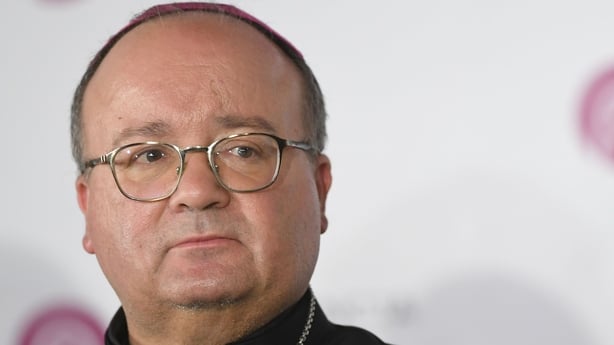Pope Francis called for a global ban on parenting via surrogacy, calling the practice "deplorable" and a grave violation of the dignity of the woman and the child.
The remarks are likely to antagonise pro-LGBT+ groups, since surrogacy is often used by gay or lesbian partners who want to have children, and follows his landmark decision to allow priests to bless same-sex couples.
"I deem deplorable the practice of so-called surrogate motherhood, which represents a grave violation of the dignity of the woman and the child, based on the exploitation of situations of the mother's material needs," he said.
"Consequently, I express my hope for an effort by the international community to prohibit this practice universally."
Pope Francis, 87, made his comments in a 45-minute address to Vatican-accredited diplomats, which is sometimes called his "state of the world" speech.
There are few statistics on the number of babies born through surrogacy.
Due to ethical concerns, the practice is illegal in many countries around the world, as well as in some US states.
Critics of the practice warn of the potential for a "poverty bias" against women who become surrogate mothers due to financial need.
But interest continues to grow as more women opt to postpone pregnancy until later in life when fertility wanes, and as more same-sex couples look for ways to start families when they cannot conceive on their own.
In Italy, the country that surrounds the Vatican, surrogacy is illegal, and Prime Minister Giorgia Meloni's right-wing coalition ruling is pushing through parliament a law that would extend the existing ban to punish couples who go abroad to carry out the procedure.
Francis, who leads the world's more than 1.35 billion Catholics, also reaffirmed the Vatican's condemnation of gender theory, which suggests that gender is more complex and fluid than the binary categories of male and female and depends on more than visible sex characteristics.
He called the theory "extremely dangerous since it cancels differences in its claim to make everyone equal".
Middle East, Ukraine war condemned
The pontiff lamented that as 2024 dawns, peace is "increasingly threatened, weakened and in some part lost".
In his geopolitical round-up, Francis unusually singled out Russia by name, noting that "large-scale war waged by the Russian Federation against Ukraine" had ground on.
It marked a break with the pope's tendency to avoid blaming Moscow for the invasion when expressing solidarity with the Ukrainian people.
Francis also condemned Hamas’ 7 October assault on southern Israel "and every instance of terrorism and extremism".
The attack had provoked a "strong Israeli military response" that had left thousands dead and created a humanitarian crisis in Gaza, he said.
Pope urged to 'seriously think about' allowing priests marry
Meanwhile, one of the pontiff's senior advisors has urged that the church "seriously think" about allowing priests to marry.

"This is probably the first time I'm saying it publicly and it will sound heretical to some people," Archbishop Charles Scicluna of Malta, who is also adjunct secretary in the Vatican's doctrinal office, told the Times of Malta.
Pope Francis has already ruled out any chance that he would change the rule requiring priests to be celibate, which is not a formal doctrine of the Church and so could be changed by a future pope.
Archbishop Scicluna, who is 64, noted that priests were allowed to marry in the first millennium of the church's history and that marriage is allowed today in the Eastern Churches, including in Russia and Ukraine.
"If it were up to me, I would revise the requirement that priests have to be celibate," he said. "Experience has shown me that this is something we need to seriously think about."
Mr Scicluna said that the church had "lost many great priests because they chose marriage", because it fails to take into account that a priest sometimes falls in love.
In 2021, the pope dismissed a proposal to allow some elderly married men to be ordained in remote areas in the Amazon wherein some places the faithful saw a priest as little as once a year.

